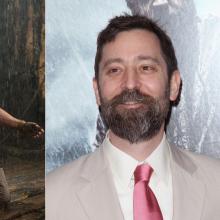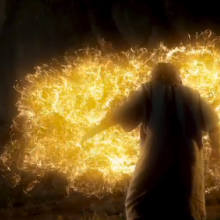Bible Stories
But it is not only the horrors that are drawn in vivid detail in the bible; it is also the grace. The New Testament is big on grace — unmerited favor, the idea that everyone is deserving of love regardless of their status and even their actions. It’s utterly illogical, and one of the things I love specifically about Christianity. Grace cannot be taught because it defies explanation; it can only be shown. When Peter calls us to “use whatever gift you have received to serve others, as faithful stewards of God's grace,” he’s making the radical plea to willingly suffer for the benefit of others. There is no place for this logic in our modern lives and yet the bible dares us to disagree; over and over we learn the power of grace through the artistry of the stories.
Have you ever been enamored by a child’s sense of wonder? Their incredulous awe in myths like the tooth fairy and Santa, their wide-eyed anticipation of unwrapping a present?
We are most inspired by the unknown.
A magic trick — how did they do it?!
A movie with surprising plot twists.
A news scandal shrouded with mystery.
We are drawn to the unknown because it tickles the innate sense of curiosity within us to discover and explore. Mystery invites participation, not for the sake of removing what is unknown, but to ignite a passion for learning beyond what is certain and be changed through the process.
Why is it then, we insist on equating our Christian faith to certainty? We sing about a Blessed Assurance and hold intensive meetings to discuss the essentials of faith. We share testimonies of God stories to shelve any doubts of God’s existence. We preach the same sermons, pray the same prayers, tell the same stories, week after week to convince ourselves it all is still true.
Is this what our Christianity has been reduced to, more of the same? I am sorry, but I simply cannot muster up anymore enthusiasm for such a formulaic faith; it’s like taking elementary classes all over again. I already know that two plus two equals four.
I am longing for the gift of uncertainty, a type of profound mystery that welcomes questions, a faith that requires a leap of faith to sustain.
I don’t know where God gets the patience. We are absolutely the most difficult people to communicate with! As the Letter to the Hebrews begins, “Long ago God spoke to our ancestors in many and various ways by the prophets.” Many and various ways – thank you, God, for trying everything you could think of to get through to us. And then, as Hebrews continues, “in these last days he has spoken to us by a Son.” And not just any, run-of-the-mill offspring. No! This Son was “appointed heir of all things,” by God, “through whom he also created the worlds.” Sending such a magnificent messenger means nothing less than a passionate desire to be heard: I AM SENDING YOU MY SON, THE ONE THROUGH WHOM I DO MY GREATEST WORK TO SHOW YOU WHO I AM! IS ANYONE LISTENING??
That was two thousand years ago and still God has not abandoned hope. At least I think God hasn’t! Which is so like God. But what is so not like us is that finally, tentatively, it appears that we are beginning to get the message. At least a part of the message that has not gotten through to us before. A Spirit of renewal has been moving through Christianity. New meanings are being discovered in Scripture, meanings that are so strange and unnatural to us that they could only have come from God. Or should I say, that they could only have been coming from God for a long, long time until we finally developed ears to hear.
Last Sunday in Los Angeles, Cathleen Falsani sat down with Ari Handel, a screenwriter and frequent collaborator with Noah director Darren Aronofsky, with whom he co-wrote the film and the graphic novel, Noah, upon which it was based, to discuss some of the extra-biblical elements of the $150 million movie.
Longtime friends Handel and Aronofsky were suitemates at Harvard University. Before becoming a screenwriter and film producer, Handel was a neuroscientist. He holds a PhD in neurobiology from New York University. He was a producer on Aronofsky’s films Black Swan, The Wrestler, and The Fountain (which he co-wrote with Aronofsky), and had a small role as a Kabbalah scholar in the director’s debut film, 1998’s Pi.
Editor’s Note: The following Q&A contains some spoilers about the film. It has been edited for length.
Whenever I hear someone lament that kids these days need to read their Bibles, I tell them that the Bible should be rated R for violence, nudity, rape, drug deals, and even genocide – and that’s just in the first book! Of course, as a youth pastor, I’ve found that the best way to get kids interested in the Bible is to tell them that if someone made it into a movie, it would be rated R.
The Bible and movies tell stories. Gareth points out the importance of stories in his article “It’s the Movies’ Fault/It’s not the Movies’ Fault” in which he brilliantly states that, “we could benefit from recognizing that the relationship between storytelling and the formation of human identity is crucial.” Indeed, the stories we tell are crucial to the formation of human identity, but the Bible and movies tell stories that are permeated with violence. So, the question becomes, how do we make sense of those violent stories in terms of human identity?
The Bible. Just the phrase sends messages, signals, and feelings to our hearts and minds, and around the world. It’s the best-selling book in human history, and one that the majority of humanity (including me), believes to have been inspired by God, with myriad interpretations of what that means.
I grew up on Bible stories, some of the best stories in human and divine history. We learned them as kids, were amazed at the images and lessons, and they were ingrained into our thinking and acting. So I watched with great delight as my sons, Luke and Jack, saw the first episode of “The Bible,” a History Channel special series that began this past Sunday and runs the five weeks through Easter. Film and television personalities Mark Burnett and Roma Downey are behind this, with a legion of others. They expect it to eventually be seen by 1 billion people.
The first Sunday show was a very dramatic depiction of the creation story, Noah’s Ark, Abraham’s call to come out to a new land, the birth of Ishmael and Isaac, the almost sacrifice of Isaac, Hebrew slavery in Egypt, Moses' call at the burning bush, and the Exodus through the Red Sea — all in two hours! I loved watching my 9-year-old Jack watch the stories with such excitement. “I know this story!” he would say and tell us what was about to happen. “I don’t know this one,” he would then comment, and we would discuss it. We had a conversation about the scary sacrifice of Isaac before bedtime, trying to figure that one out. I told him I couldn’t have been as obedient as Abraham was.
Israel reported last week that it successfully tested its latest missile defense system. Known as “David’s Sling,” it is designed to shoot down midrange missiles from Hezbollah rockets originating from Lebanon.
I don’t want to get bogged down in a discussion about Israel’s right to defend itself. What I want to do is explore the biblical reference to “David’s Sling” and what it might mean for us. The name is an obvious allusion to the story of David’s victory over Goliath. It’s a favorite biblical story for many Sunday school teachers, but a conundrum for those teachers who take mimetic theory seriously. Mimetic theory claims that violence belongs to humans, not to God. It also states that the Bible progressively reveals this message about violence to us. And yet, the connection between God and violence permeates the Bible, with God apparently sanctioning violence against God’s enemies.
So we rightly ask, “What about all the violence in the Bible?”
Why, despite mutual suspicions, Christianity and comics go together like paper and ink.







